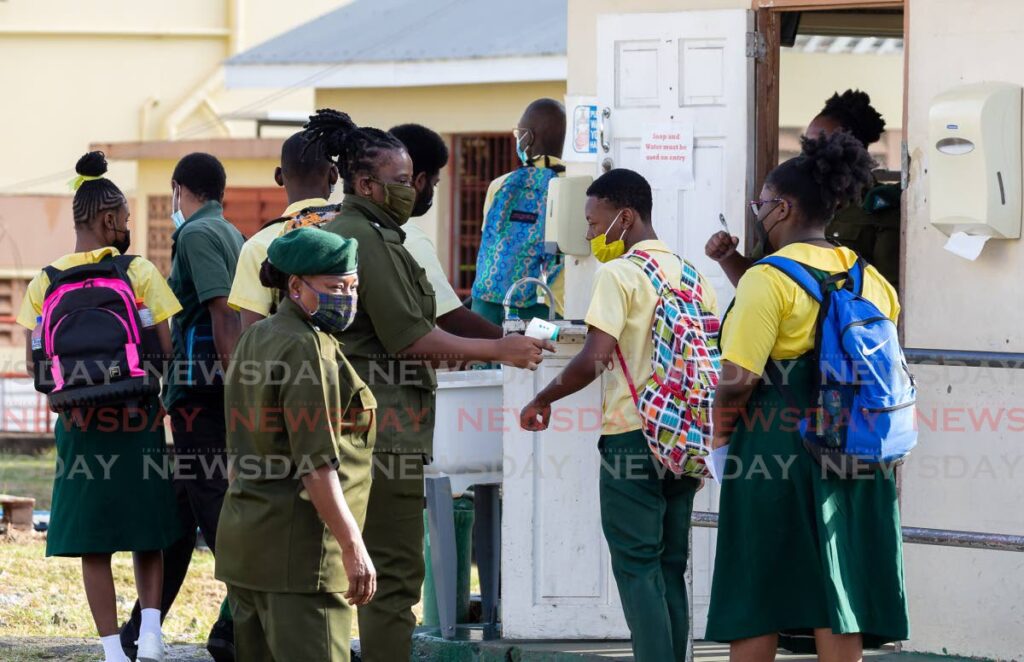UNFPA: Family violence to be included in schools’ HFLE curriculum

The Health, Family and Life Education (HFLE) curriculum in primary and secondary schools is being revised to include family violence.
This was revealed on Saturday by United Nations Population Fund (UNFPA) gender-based violence specialist Asiya Mohammed.
She was addressing a forum titled GBV & ME: Insights and Solutions For The Youth Of The Region, at the Prime Minister’s official residence, Blenheim, Tobago.
The event was hosted by the Indigenous Creative Arts Network (ICAN) as part of the United Nations Spotlight project.
The Spotlight Initiative is a global, multi-year accelerated programme funded by the European Union in collaboration with the United Nations to address all forms of violence against women and girls and in the Caribbean, family violence. Its local champion is Sharon Rowley, wife of the Prime Minister.
Mohammed brought remarks on behalf of director, UNFPA’s sub regional office of the Caribbean, Alison Drayton and UNFPA country liaison officer for Trinidad and Tobago Aurora Noguera-Ramkissoon.
She recognised the role of the Ministry of Education and University of the West Indies in seeking to include family violence in the HFLE in the primary and secondary schools curricula.
“The goal is to integrate preventative measures to help change beliefs and practices that foster VAWG and comprehensive sexuality education and to ensure that young people are adequately equipped to report incidents of violence and find the resources and support they require,” she said.
Mohammed said under phase 1 of the Spotlight initiative, secondary and primary school teachers will receive important teacher training on delivering the new HFLE curricula to young people.
She added they are also partnering with the Family Planning Association of Trinidad and Tobago to promote greater awareness about the need to prevent attitudes that foster gender-based violence while also creating an environment where young people feel supported and equipped with information and tools to seek guidance and support in addressing the issue.
“We must facilitate an environment that takes a strong stance against GBV, which is paramount not only to young people but to the country at large.”
According to Mohammed, one in three women globally will experience physical or sexual violence in her lifetime.
In 2017, she said Women’s Health Survey revealed that 30 per cent of ever-partnered women experienced physical and or sexual violence by an intimate partner in their lifetime, and that 31 per cent have experienced sexual violence either by a partner or non-partner.
To compound matters, Mohammed said child abuse, including child sexual abuse, is also prevalent.
She added, during the pandemic they had also seen an increase in the number of reports of family violence.
“The impact of family violence is quite significant. Not only does it affect the day-to-day lives of survivors, but it also impedes economic empowerment, children’s rights, the enjoyment of sexual and reproductive health and rights, and constrains autonomy and security.”
The Children’s Authority, Mohammed said, also reported an increase in reports of emotional abuse against minors during covid19.
“And we are still grappling with the findings of the December 2021 Safeguarding Children report conducted by the independent investigative team appointed by the Cabinet of Trinidad and Tobago to investigate reports of child abuse at children’s home.”
Mohammed said the problems are compounded by the lack of supportive structures for children experiencing gender-based violence, where they are not exposed to preventative measures that address beliefs and practices that foster gender inequality such as abuse of women and girls.
“This is why we need to put measures in place to protect our women and children….. It takes a whole-of-society approach – government, civil society and international partners - if we are to achieve our global strategic commitment of zero gender-based violence, including harmful practices.”


Comments
"UNFPA: Family violence to be included in schools’ HFLE curriculum"